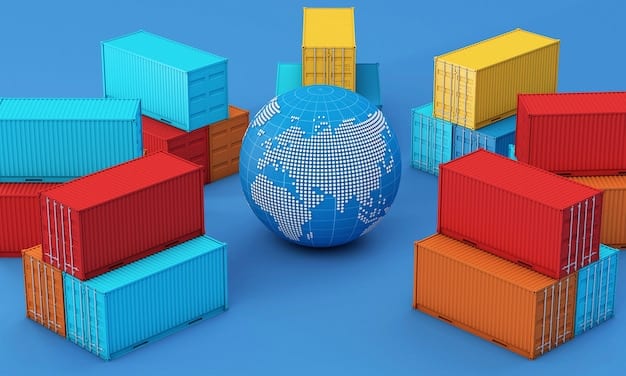Blockchain Technology: Securing the US Logistics Supply Chain

Blockchain technology offers a decentralized, secure, and transparent solution to enhance the efficiency and security of the US logistics supply chain by providing immutable records, improved traceability, and reduced fraud.
In today’s complex and interconnected world, the **blockchain technology: securing the US logistics supply chain** becomes increasingly vital for efficiency, transparency, and security. This article explores how blockchain is revolutionizing the logistics sector, addressing key challenges, and creating new opportunities for growth and innovation.
Understanding Blockchain Technology
Blockchain technology, at its core, is a decentralized ledger system that records transactions across many computers. This system ensures that once a record is added, it cannot be altered, making it highly secure and transparent. Understanding the fundamentals of blockchain is crucial to appreciating its potential in transforming various industries, including logistics.
Decentralized Ledger System
A decentralized ledger system distributes data across multiple participants, eliminating the need for a central authority. This feature enhances security and reduces the risk of a single point of failure, making blockchain a robust solution for managing sensitive information.
Immutable Records
One of the key characteristics of blockchain is its immutability. Once a transaction is recorded on the blockchain, it cannot be altered or deleted. This ensures the integrity of the data and builds trust among participants in the network.
- Enhanced security due to the distributed nature of the data.
- Increased transparency as all participants can view the records.
- Reduced risk of fraud and manipulation.
- Improved trust among stakeholders.
Blockchain’s ability to provide a secure and transparent record of transactions makes it particularly valuable in logistics. By implementing blockchain, companies can track goods more efficiently, reduce paperwork, and enhance overall supply chain visibility.
Current Challenges in the US Logistics Supply Chain

The US logistics supply chain faces numerous challenges, including inefficiencies, lack of transparency, and security risks. These challenges can lead to delays, increased costs, and reduced customer satisfaction. Addressing these issues is crucial for maintaining competitiveness and ensuring the smooth flow of goods.
Inefficiencies and Delays
Traditional logistics processes often involve multiple intermediaries and manual paperwork, leading to inefficiencies and delays. These delays can disrupt the supply chain and increase operational costs.
Lack of Transparency
The lack of transparency in the supply chain makes it difficult to track goods and verify their authenticity. This can result in fraud, counterfeiting, and other security risks.
- Increased operational costs due to delays and inefficiencies.
- Higher risk of fraud and counterfeiting.
- Reduced customer satisfaction due to unreliable deliveries.
- Difficulty in tracking goods and managing inventory.
By leveraging blockchain technology, the US logistics supply chain can overcome these challenges and improve its overall performance. Blockchain’s ability to provide a secure and transparent record of transactions can streamline processes, reduce costs, and enhance security.
How Blockchain Enhances Security in Logistics
Security is a paramount concern in the logistics industry. Blockchain technology offers several advantages in enhancing security, including preventing tampering with records, ensuring data integrity, and improving traceability.
Preventing Tampering with Records
Blockchain’s immutable records make it impossible to tamper with data. Any attempt to alter a transaction would require changing the entire chain, which is computationally infeasible. This feature ensures the integrity and reliability of the data.
Ensuring Data Integrity
Blockchain uses cryptographic techniques to ensure that data remains secure and unaltered. Each transaction is linked to the previous one, creating a chain of records that is virtually impenetrable.
The implementation of blockchain technology can significantly reduce the risk of fraud and theft in the logistics supply chain. By providing a secure and transparent record of transactions, blockchain ensures that goods are tracked and managed more effectively.
Improved Traceability with Blockchain

Traceability is a critical aspect of logistics, allowing companies to track the movement of goods from origin to delivery. Blockchain technology enhances traceability by providing a secure and transparent record of each transaction, enabling real-time tracking and verification.
Real-Time Tracking
Blockchain enables real-time tracking of goods, providing companies with up-to-date information on their location and status. This allows for better inventory management and faster response to disruptions.
Verification of Authenticity
By recording each transaction on the blockchain, companies can verify the authenticity of goods and prevent counterfeiting. This is particularly important for industries such as pharmaceuticals and luxury goods.
- Real-time tracking of goods from origin to delivery.
- Improved inventory management and reduced losses.
- Verification of authenticity and prevention of counterfeiting.
- Enhanced compliance with regulatory requirements.
Blockchain technology’s ability to provide end-to-end traceability can transform the logistics supply chain, making it more efficient, secure, and transparent. This enhances trust among stakeholders and improves overall performance.
Use Cases of Blockchain in US Logistics
Several companies in the US are already implementing blockchain technology to improve their logistics operations. These use cases demonstrate the potential of blockchain to address specific challenges and create new opportunities for growth.
Supply Chain Management
Blockchain is being used to manage supply chains more efficiently by tracking goods, managing inventory, and verifying authenticity. This enhances transparency and reduces the risk of fraud.
Payment Systems
Blockchain-based payment systems are streamlining transactions in the logistics industry, reducing delays and costs. These systems enable faster and more secure payments among stakeholders.
These real-world examples highlight the diverse applications of blockchain in the US logistics supply chain. As more companies adopt blockchain technology, the benefits will become more widespread, leading to a more efficient and secure logistics ecosystem.
Challenges and Future Trends
While blockchain technology offers significant benefits, there are also challenges to overcome. These include scalability issues, regulatory uncertainties, and the need for industry-wide collaboration.
Scalability Issues
Blockchain networks can face scalability issues, particularly when processing large volumes of transactions. Addressing these challenges is crucial for ensuring that blockchain can support the demands of the logistics industry.
Regulatory Uncertainties
The lack of clear regulatory frameworks for blockchain technology creates uncertainty and can hinder adoption. Governments and regulatory bodies need to provide guidance and standards to foster innovation and ensure compliance.
- Addressing scalability issues to support high transaction volumes.
- Establishing clear regulatory frameworks to foster innovation and compliance.
- Promoting industry-wide collaboration to standardize blockchain implementations.
- Investing in education and training to build expertise in blockchain technology.
Despite these challenges, the future of blockchain in the US logistics supply chain is bright. As technology evolves and adoption increases, blockchain will play an increasingly important role in enhancing security, transparency, and efficiency.
| Key Point | Brief Description |
|---|---|
| 🔍 Traceability | Improved end-to-end product tracking. |
| 🔒 Security | Enhanced data protection, preventing fraud. |
| ⏱️ Efficiency | Streamlined processes, reducing delays. |
| 🤝 Collaboration | Improved trust among stakeholders. |
Frequently Asked Questions (FAQ)
▼
Blockchain technology is a decentralized, immutable ledger system that records transactions across many computers, ensuring high security and transparency in data management.
▼
Blockchain enhances security by preventing tampering with records, ensuring data integrity through cryptography, and improving overall traceability of goods within the supply chain.
▼
The main challenges include scalability issues, regulatory uncertainties, and the need for industry-wide collaboration to standardize blockchain implementations and ensure widespread adoption.
▼
Yes, blockchain significantly improves traceability by providing a secure and transparent record of each transaction, allowing real-time tracking and verification of the authenticity of goods.
▼
Real-world use cases include supply chain management for tracking goods and managing inventory, and blockchain-based payment systems to streamline transactions, reducing delays and costs for stakeholders.
Conclusion
In conclusion, **blockchain technology** holds immense potential for revolutionizing the US logistics supply chain by enhancing security, improving traceability, and streamlining processes. While challenges remain, the benefits of blockchain are undeniable, making it a crucial technology for the future of logistics in the United States.





